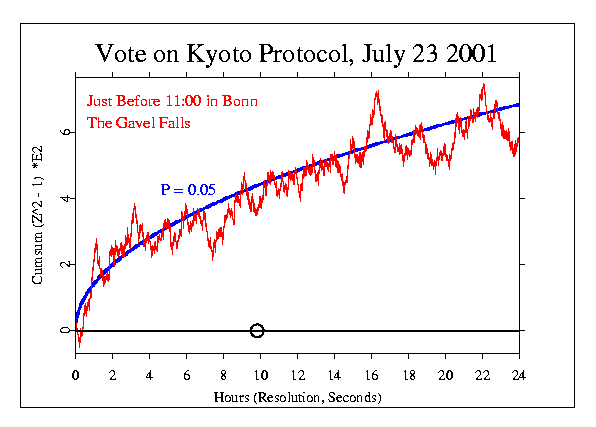|
BONN, Germany, July 23 -- The world's nations, minus the United States,
accepted treaty rules that for the first time would require
industrialized countries to cut emissions of waste gases linked to
global warming.
The agreement, reached after four pressurized days of formal talks here,
paves the way for ratification of the Kyoto Protocol, which was conceived
in 1995, negotiated in Japan two years later, signed by nearly 100
countries, including the United States, and rejected earlier this year by
President Bush.
This morning, largely galvanized by the European Union, 178 countries
consented to detailed language that moved the proposed treaty along the
path from a sketchy plan for reducing the human impact on the atmosphere
toward a binding environmental contract.
...
But the overwhelming sentiment of American, Japanese, and European
environmental groups was that this was a historic agreement.
"It allows us to begin the long journey of confronting global warming,
the most serious environmental threat of the 21st century," ...
...
In the end, the diverse array of countries at the table, some grudgingly,
overcame differences under strong pressure to avoid an embarrassing
deadlock over the rules that could have been the undoing of the treaty
itself.
The deal was sealed just before 11 a.m. with an auctioneer-fast crack of
Mr. Pronk's gavel. With that stroke, he found some measure of retribution
after presiding over the failed talks in the Hague.
The writing of the rules caps a six-year struggle between a group of
industries and countries that claimed mandatory emissions caps would harm
economies and environmental groups and other countries that saw required
limits as the only way to stave off potentially disruptive climate
shifts.
...
Many countries said that the completion of the rules meant they could
take the pact home to start the ratification effort.
Formal adoption of the agreement is scheduled to take place in Marrakech
at the end of October.
----
The figure below shows the cumulative deviation of 32 eggs during the whole
day of 23 July 2001, with the approximate time of the acceptance vote
indicated by a black circle just before 10:00 GMT. The steady trend
culminates in a Chisquare of 86962 on 86400 degrees of freedom, with
a marginally significant probability of 0.088.

|